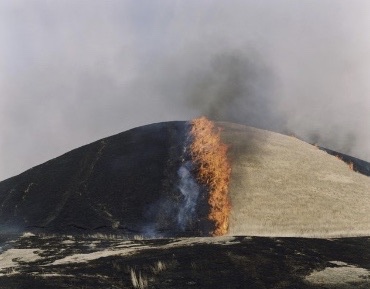The book pivots around the disorientation of the “aesthetics of minutiae, with their promise of infinitude”; a pointed and inconclusive protest against an “awareness of orders of magnitude that include atrocity, war, capitalism , and perhaps—though it may be mortality’s saving grade—death.”
Tag: Friedrich Hölderlin
Jacques Rancière & Philippe Lafosse | Politics and Aesthetics in the Straubs’ Films
Jacques Rancière, Philippe Lafosse and the public in conversation about Straub-Huillet after a screening of From the Clouds to the Resistance and Workers, Peasants Monday, February 16, 2004, Jean Vigo Cinema, Nice, France PHILIPPE LAFOSSE: It seemed interesting to us, after having seen twelve films by Jean-Marie Straub and Danièle Huillet and talked about them together, to ask another viewer, a philosopher and cinephile, to talk to us about these filmmakers. Jacques Rancière is with us this evening to tackle a subject that we’ve entitled “Politics and Aesthetics in the Straubs’ Films,” knowing that we could then look into other…
PORNO-TEO-KOLOSSAL ((nach Pasolini))
Die Verweigerung ist schon immer eine essenzielle Geste gewesen. Denk nur an die Heiligen, die Eremiten, aber auch an die Intellektuellen. Die Wenigen, die die Geschichte gemacht haben, das waren diejenigen, die Nein gesagt haben, nicht die Höflinge oder die Diener der Kardinäle. Pier Paolo Pasolini I. 5:11 am Nachmittag: das Gefühl, dass der Geist, das Bewußtsein wie ein Sprengsatz explodieren / ich schwöre :: die einfachsten Bewegungen des Körpers nicht mehr zu kontrollieren sind und der Blick beginnt sich um sich selbst zu drehen — Einverständnis ist eine Falle. Zeit und Raum ineinander…
Jean-Marie Straub / Danièle Huillet | Hölderlin, That Is Utopia
Jean-Marie Straub: Hölderlin experienced the birth of the Wilhelmine Age. He was a young poet, full of high-flying plants; he said that himself. He was twenty-eight years old when he wrote The Death of Empedocles. In Germany between 1789 and 1798 all kinds of things had happened. Things had gone well for the ruling class, less well for other people. Büchner had had to flee, and some others as well . . . Hölderlin dreamed of the revolution—let’s call it that, even if the word is no longer in fashion today—a revolution that did not take place. As an…
UNE INSULTE À LA REPUBLIQUE: AIMÉ CÉSAIRE AND FRIEDRICH HÖLDERLIN …
UNE INSULTE À LA RÉPUBLIQUE: AIMÉ CÉSAIRE AND FRIEDRICH HÖLDERLIN DECLARE THE FRENCH REVOLUTION A TRAGEDY, VOW TO SUPPORT #GILETSJAUNES MOVEMENT INSTEAD | by H. Bolin I. Introduction The study that follows concerns two tragic plays that treat the emergence and aftermath of a single global revolutionary horizon which included both the French and the Haitian revolutions. As the tragic genre suggests, Friedrich Hölderlin’s The Death of Empedocles (1799) and Aime Césaire’s And the Dogs Were Silent (1956) stage reflections on the initial successes and subsequent defeat of their respective revolutionary moments. What can tragedy or art offer to thinking…
Anmerkungen zum Geschehen ((Totenklage))
Das griechischtragische Wort ist tödlich-faktisch, weil der Leib, den es ergreift, wirklich tötet. Hölderlin Ohne Zweifel ist dies von allen widerlichen Momenten der widerlichste : es reicht nicht länger zu sagen : Ziel ist die Aufhebung des Kapitalistischen Realismus : oder Verse an die Tür einer Zelle zu hämmern wie man einen Nagel in eine Wand schlägt, wenn eine enthemmte Politkaste als Urheber täglich neuer Demütigungen, uns die verbliebenen Krumen vom Tischtuch eines inszenierten Abendmahls zuspielt / dass ich auf solch eine Vermessenheit reagieren muss wird dir klar…
Sean Bonney | Our Death
Our Death / Abject 2 (after Baudelaire) Great love, that will crush the human world, I wish we could do something to help each other. But today we are separated by so many tedious enemies. They smile at us all day long and ask us about our fever. What is there to say? That “fever”, in the way they pronounce it, isn’t much more than a weird reflection of their smile, which in itself is a symbol of their sense of rightness within the so-called world. But that we feel that the five characters that make up the word…







